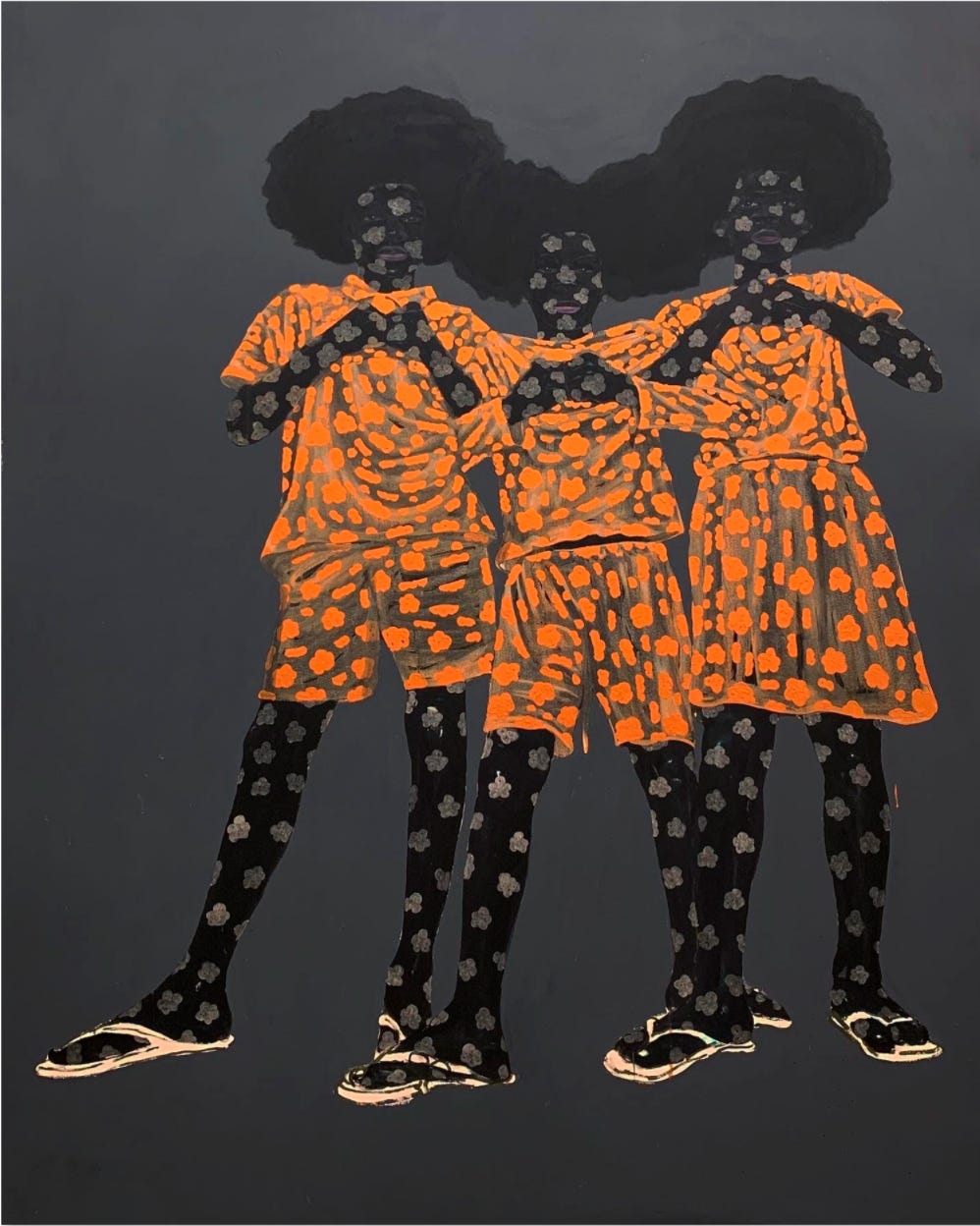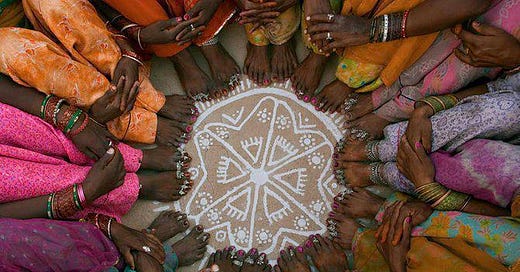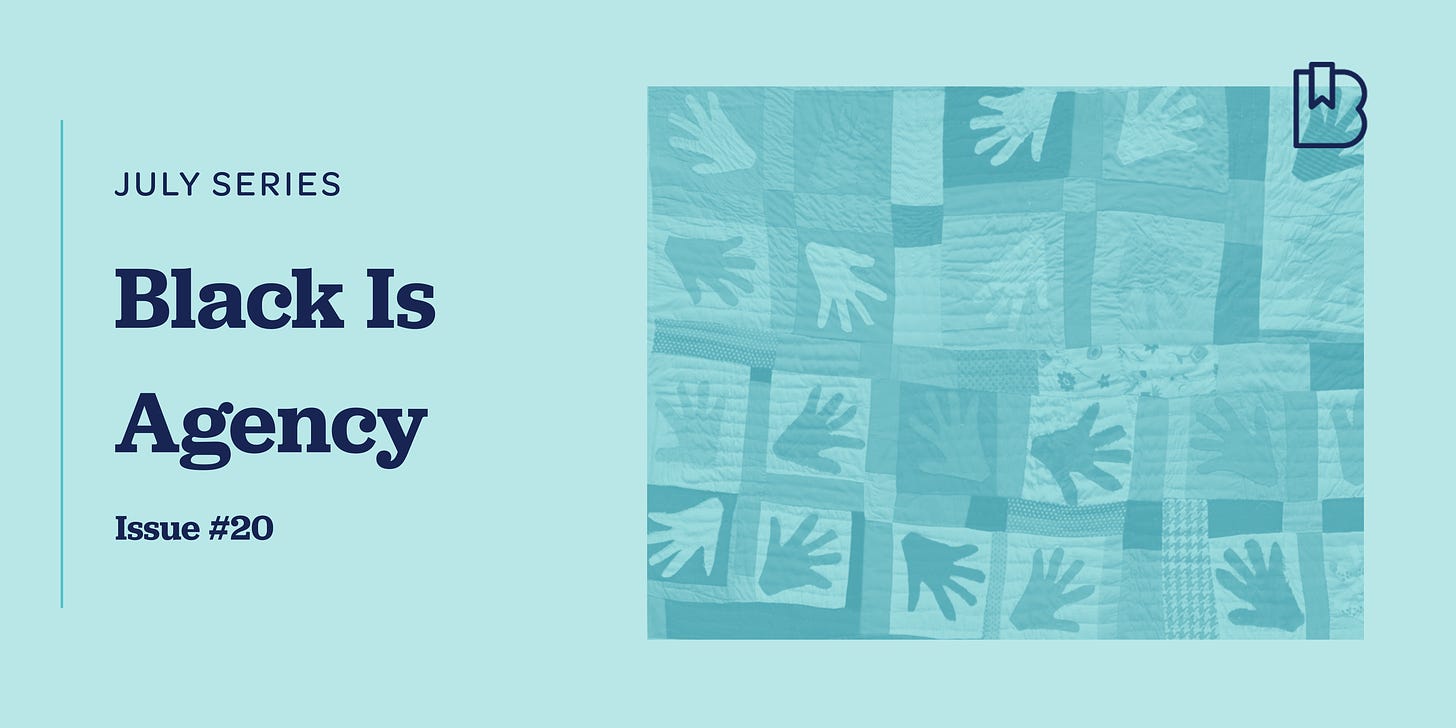Black is Agency:
Welcome to issue #20! 🏳️🌈
I was recently reflecting on the links between the Black diaspora and our African ancestors. Despite the long and storied journey, foundational elements of our history, language and traditions remain intact. Ubuntu, which we are exploring today, is one of those cultural building blocks. As you'll see, it plays a role in every aspect of our society. It is also embedded in the DNA of our Black to School Collective.
Black To School celebrates Black people and Black contributions around the world. The “Why?” that powers our mission is simple. “Our ancestors invented the table that the world now sits at. It’s time to not just claim our seat, but to set the agenda.”
This month we've been going behind the scenes at Black to School to show how the concept of agency informs everything we do. Last week, we reflected on brand associations of Black people and how they influence our perceptions and behaviors.
A special thanks 🙏🏾 to the readers below who were our “Golden Griots'' (or top sharers) last week. Please keep sharing stories of #blackcontributions and our collective history within your networks!
Sharon B.
Nik R.
Dawn M.
Emma G.P.
Saamra M.G.
In this issue, we’ll:
Discover the role of ubuntu in shaping Black to School as a modern griot.
Learn how the ubuntu mindset helps us thrive, individually and as a society.
Collective Consciousness
Contributor: Sharon Hurley Hall
Community is a concept that we often take for granted. We are both born into (and intentionally or unintentionally opt-into) communities whether they are our families, neighborhoods, social networks, professional affiliations, identity groups, tribes, nation-states, and more.
The underlying glue that holds any community together is our individual desire to share the experience of living with one another. In pursuit of that universal desire, we are willing (and actively do) sacrifice time, energy, resources, and our ego. It's what drives people with seemingly different interests, backgrounds and environments to cooperate and collaborate. That collective responsibility is at the heart of the concept of ubuntu.
Shared Humanity
Archbishop Emeritus Desmond Tutu, a well-known proponent of ubuntu says: “My humanity is caught up, bound up, inextricably, with yours. When I dehumanize you, I inexorably dehumanize myself."
This recognition of shared humanity underpins ubuntu wherever it shows up. And it shows up in multiple African cultures and languages. In Nguni Bantu, it means “humanity”. In Zulu, it has the sense of “humanity towards others.” In Xhosa, it’s about recognizing the universal bond that connects all of humanity. And sometimes, it’s translated “I am because we are.”
Ubuntu asserts that society and community are essential to our humanity, and that we are all part of a larger world, whether you’re talking about your community, society, or the spiritual realm. With ubuntu, we recognize and appreciate differences, while acknowledging that we are part of a community. Sharing, caring, trust, and unselfishness are primary.
When we have ubuntu, we know our place in the world and how our actions affect others, and act accordingly to benefit the community as a whole. As historian, Michael Onyebuchi Eze says, “Humanity is a quality we owe to each other.”
Ubuntu and Reconciliation
That recognition has guided some of the most important political processes of modern times. Ubuntu was first recorded in South African writings in the 1900s, and the writings of Desmond Tutu and Nelson Mandela brought the term to a wider audience outside of Africa.
In post-apartheid South Africa, ubuntu guided the actions of the Truth and Reconciliation Commission, which focused on forgiveness and reconciliation rather than vengeance while still requiring accountability. The same principle underpinned the gacaca courts after the genocide in Rwanda.
According to Conflict Policy Researcher, Tim Murithi, key aspects of an ubuntu guided reconciliation process are:
Public participation
Supporting both victims and perpetrators
Acknowledging remorse and offering forgiveness
Reminders of our shared humanity
Empathy, sharing and cooperation
While some have criticized ubuntu as a woolly philosophy, many more agree that it has worked well in these processes, and also see it as a way to foster ethical leadership in African countries (and why not in the world?)
Financing the Collective
But ubuntu also has practical applications in our daily lives. When I was growing up, I remember my mother taking part in a susu or meeting-turn, an informal savings system where everyone contributed a set amount of money monthly, and one person took the lump sum. It was a way for people to save without going through the banks, and was built on a foundation of trust in the other members of the group.
Similarly, community savings circles (or, as they are also known, rotating savings and credit associations - ROSCAs) exist in multiple African countries. There are widely shared stories about using the same system in ancient times, but this practice is also very much of the modern era. Jeffery Ashe calls it "financial inclusion without financial institutions". It's become part of the financing landscape in many countries, with as many as 30% of people using them to improve their lives. So peer-to-peer lending isn't a new concept; it comes from African societies living ubuntu.
Ubuntu has also gone digital with collaborative efforts by 31 African countries to have decentralized African currency based on blockchain as well as huge strides in growing peer-to-peer bitcoin trading volumes.
Tech That
Ubuntu was also the inspiration behind Linux's Ubuntu OS. Invented by South African entrepreneur, Mark Shuttleworth, it is the world's most popular free operating system. On the back of this, Linux reinvented itself on the principle of community and a social and economic mission to provide free software to everyone and to reduce the cost of services. Linux has attracted some of the greatest minds in the world as users, and powers ALL of the world's top supercomputers.
Ubuntu at Black to School
The mission of Black To School is to make global Black contributions -past and present - common knowledge. As it stands, what is required to get this information to the masses is too big an undertaking for just those professional historians who dedicate their lives to the research, education, and dissemination of this knowledge.
At Black To School, our approach is to simultaneously engage each member of our global community within their interest areas to broaden the knowledge base and diversify the channels within which this information is shared. Within the context of Black To School, ubuntu is the distribution and communication philosophy that enables us to shift mindset and behaviors about what it means to be Black.
We draw from a community of Black experts across disciplines from medicine, healthcare, finance, journalism, real estate, government, and science to the arts, linguistics, energy, education, fashion, food, hospitality and more. Each has tremendous domain expertise and by virtue of their contributions to Black To School play an important role as griot, educating themselves and others about the contributions of Africans and the Diaspora in their industry and beyond.
If you are interested in becoming a Black To School Contributor, please contact us at info@blcktoschool.com for more details.

A Griot's Eye View
From community groups to fostering ethical leadership, this totally African cultural tradition of ubuntu has spread around the globe and has the potential to continue to transform our world. Ubuntu United Nations is leading the charge by inspiring a new generation of global leaders to reflect on and act in honor of our shared story. Black community is a celebration of our collective humanity.
🛠️ The Black To School Toolkit
Now What? Dig Deeper with Friends, Family, and Others.
Do you want to take a deeper dive on ubuntu? Check out this TED Talk and read this insightful blog roundup.
Ready to introduce the concept of ubuntu to your kids? This book is great for kids age 12 and under.
Want to know how young professionals are engaging? Join emerging leaders (ages 18 to 35) from 193 countries in modeling ubuntu on a global level.
Curious to learn from two guys who embody it? Be forever changed by reading The Book of Joy by the Dalai Lama and Archbishop Desmond Tutu.
Interested in the history and future of open-source? Learn more about the most significant open source software and fast growing open-source startups.
Let’s join the ubuntu revolution! Try the Ubuntu Love Challenge or support the Mind & Life Digital Dialogue.
⌛ The Black To School Timeline
Black Community Is A Celebration of Our Collective Humanity
First, we shared an overview of our Editorial Process. The Point of View: Reframing the Conversation, understanding and curating our story is one of the most powerful ways that we exercise our agency.
Next, we revealed our Research Methods. The Practice: Showcasing the Evidence, finding and vetting the data and sources is all about going deep and identifying patterns with trusted sources.
Then, we showcase our Design Philosophy. The Brand: Style Guide, there is intention and Black creative talent embedded in every aspect of our appearance and experience.
Finally, we reflect on our Collective Model. The Community: The Contributors, the ubuntu principle is at the heart of our distribution strategy and the network of domain experts who work with us to tell our full story to the world.
About This Week’s Contributor
Sharon Hurley Hall
Sharon Hurley Hall (she/her) is an anti-racism activist, writer and educator. She is committed to doing her part to eliminate racism one article at a time, and is the creator and publisher of an anti-racism newsletter. She is the Team Lead for Diversity, Equity and Belonging at Omnis Education.
Sharon is the author of Exploring Shadeism, an analysis of the colorism phenomenon in Barbados and the wider Caribbean. She is also the co-host of The Introvert Sisters podcast, and is a professional B2B writer and blogger.
Sharon practices the principle of ubuntu by fostering community through her newsletter, which includes the amplification of other Black writers and anti-racism perspectives in its mission.
Sharon holds MA degrees in Media and Cultural Studies, and in Teaching and Learning in Higher Education. She helped develop and teach the MA Journalism programme at Coventry University in the UK. As an educator at heart, Sharon loves the Black to School mission of telling our stories our way, drawing on collective wisdom to expand collective knowledge.






